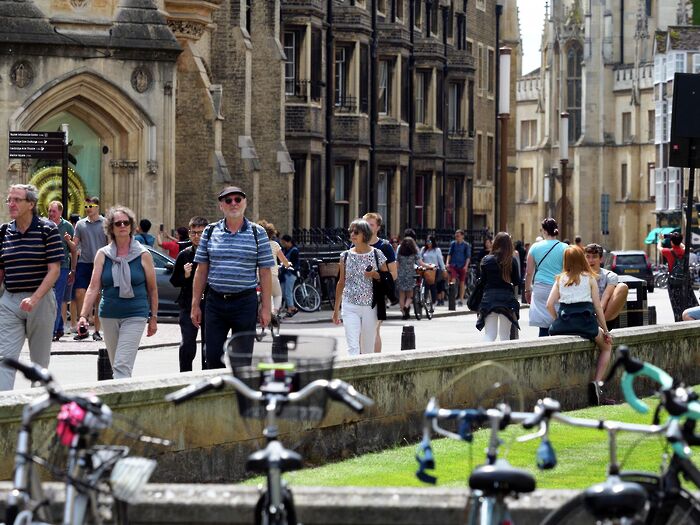CUSU Ethical Affairs latest to criticise Oxford to Cambridge Expressway
The government proposal would see road building and improvements to better connect Oxford and Cambridge, but has drawn criticism due to its predicted environmental impact

CUSU’s Ethical Affairs Campaign have warned the government’s suggested Oxford to Cambridge Expressway will have “polluting” and “detrimental” consequences, joining other activist groups and Cambridge’s MP Daniel Zeichner in criticising the proposal.
Speaking to Varsity, the Campaign stressed the Expressway will “clearly create severe environmental damage” and “should therefore be critically examined by the University and its environmental impacts scrutinised.”
The government first published the proposal in 2015, to better connect Cambridge, Milton Keynes, and Oxford. Updated plans were due for public consultation last year, though this was delayed in light of the election - and is still yet to take place.
Last week, Zeichner suggested in Parliament that rail should be prioritised over building more polluting roads. The MP had already pledged opposition to the Expressway during the recent General Election, alongside the Cambridge Liberal Democrat, Green Party and Brexit Party candidates.
“The real answer is a railway, a public railway, an electrified railway, with an interchange with HS2,” Zeichner told the House of Commons.
CUSU Ethical Affairs highlighted other worries related to the Expressway, including that it “unduly prioritises the South-East of the UK at a time when there is chronic underspending in infrastructure in the North of England”.
They further emphasised enhancing the Oxford and Cambridge ′brain belt’ may lead to a ′brain drain’ - the exodus of intellectuals and academics - from the North to the South East of the UK.
“We believe that rather than increasing this divide, the government, rail services, and UK Universities should be working together to increase academic and local interconnectivity, rather than encouraging exclusivity”.
Another concern is the increasing prices in the city that may come with increased connectivity and investment. This could push locals further to the outskirts, as Cambridge becomes increasingly unaffordable.
To “increase the validity of this project” from currently only “enhancing [the government’s] business and commercial interests”, the CUSU Campaign suggest “local councils, committees must be created and consulted on this issue before works can go ahead.”
“Only when an open and public consultation on the Oxford-Cambridge line (involving local communities, students, workers and university members), will we be able to fully gauge the public opinion on this issue.”
Transport Minister George Freeman affirmed the government is “deeply committed to rail, to connectivity, and to sustainable transport”, but refused to “pre-empt the Secretary of State’s announcement on the Expressway”.
The Expressway proposal, estimated to cost around £3-3.5 billion, was initially part of the government’s 2015-2020 Road Investment Strategy.
It aimed to connect the ‘brain belt’, and do away with the “artificial barrier between hubs of knowledge-based growth” caused by poor roads, and stimulate economic development in nearby towns.
But this has seen opposition principally on environmental grounds, with the local protest group No Expressway Alliance criticising the plan, arguing this is “not the right response to any problem when we are in a state of environmental emergency”.
A Change.org petition calling on the government to cancel the scheme has so far received more than 9,000 signatures.
The Campaign stressed further concerns around the environmental impact of the East West Railway (EWR), which is currently under construction and will connect Oxford to Cambridge.
Involved in a consultation with the University in March last year concerning the EWR, the CUSU Campaign noted they were “disappointed” with the University’s subsequent response.
The University had stated it was “fully support and remain committed to the overriding aim of the EWR” and welcomed “the proposed additional work to fully assess the impact of the scheme on the environment.”
“Discussions with East West Rail are ongoing, and the University will continue to advocate sustainable investment that promotes biodiversity while facilitating better public transport services,” a University spokesman told Varsity.
“Shifting away from the use of private vehicles must be a central element of our local and national environmental vision.”
 Comment / Cambridge students are too opinionated 21 April 2025
Comment / Cambridge students are too opinionated 21 April 2025 Comment / Cambridge’s tourism risks commodifying students18 April 2025
Comment / Cambridge’s tourism risks commodifying students18 April 2025 Interviews / Meet the Chaplain who’s working to make Cambridge a university of sanctuary for refugees20 April 2025
Interviews / Meet the Chaplain who’s working to make Cambridge a university of sanctuary for refugees20 April 2025 News / News in brief: campaigning and drinking20 April 2025
News / News in brief: campaigning and drinking20 April 2025 Lifestyle / Which coffee are you?20 April 2025
Lifestyle / Which coffee are you?20 April 2025






